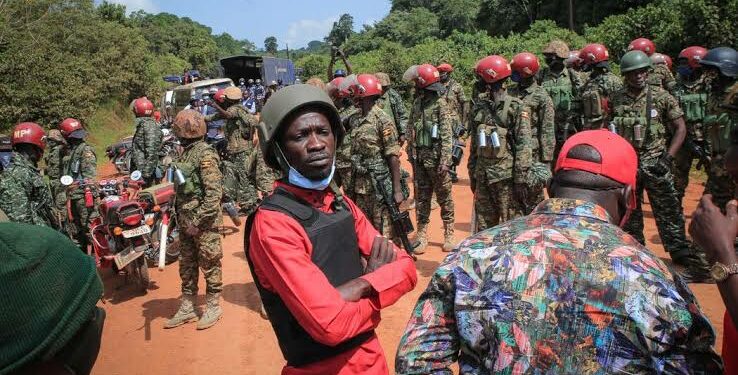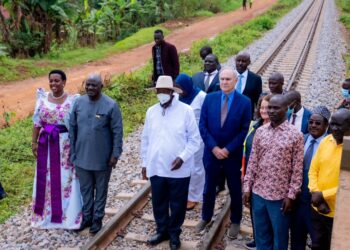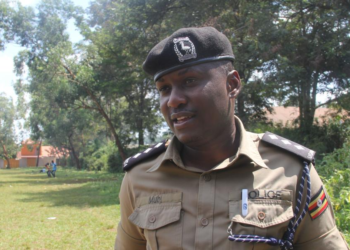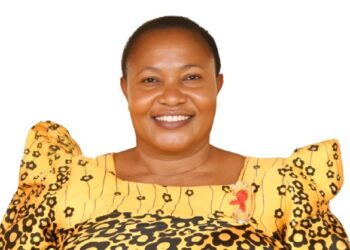The involvement of the military in Uganda’s politics started earlier in 1966 a few year after the country had attained her independence in 1962. For over 20 years Uganda was in military coups until late 1986 when the present government took over power after a five-year guerilla war.
The 1986 National Resistance Army group(now NRM) came with a gospel of democratizing Uganda and citizens welcomed them because they were tired of wars; they saw President Yoweri Museveni and colleagues as messiahs of hope. Although since 1986 Uganda has not experienced any military coup, the promised gospel for democratizing Uganda has faced it hard to blossom due to money and involvement of the military in all Uganda’s political cycles right from the lowest office to the topmost.
Uganda has been holding elections as one of the signs of a democratized country. However, the intervention of both money and military has always created stains in Uganda’s journey to democracy.
Speaking during one of the political engagements last month organized by Alliance for Finance Monitoring (ACFIM), Mr. Jude Obitre, an associate of King’s College London cautioned that the unregulated use of money has played a big role in determining electoral outcomes hence disrupting democracy.
“Since money is a critical enabler in manipulating votes, many of the leaders that win are not proficient enough which explains the deficit in leadership and governance in Uganda and Africa at large. Elections in Africa are bitter struggles to access power and state resources therefore electoral manipulation equals to money squared,” Obitre said.
Obitre also warned that democracy in Africa, Uganda inclusive has been weaponized because power revolves around those who hold the gun pointing at the electorate thus demeaning democracy.
“Africa is caught between democracy on one hand and authoritarianism on the other. Currently, in Uganda and other countries like Zimbabwe, the army has militarized politics and this must be corrected earlier otherwise military coups in Uganda are on verging of coming back after three decades. Militarization of politics in many countries in Africa has undermined democracy.”
He added, “The involvement of the military is always a move by incumbents and the only way to avoid this, is to come up with a strong constitutional culture that will not be altered by the incumbent.”
Recent reports by the African Development Bank (ADB) have also shown that in a democratic state, military intrusion in politics inhibits democracy because “intrusion” involves moving beyond constitutionally and democratically mandated roles and goes against the authority vested in democratically elected civilians.
In one of the Journals of democracy ‘Democracy’s Third Wav’ by Huntington, Samuel P, he explains that when the military intrudes in the politics of a democracy, it intrudes upon the sovereignty of the people who elected representatives to government. The occurrence of a coup in a democracy, therefore, points to the failure of democratization.
Effects of military intrusions in the country’s politics
Historically, military intrusions have led to coups and in most cases, at first, they have been a source of hope for Africans who have suffered under corrupt and repressive civilian-led regimes. Forexample, in 1971, the seizure of the power by Major-General Idi Amin Dada and news of Milton Obote’s deposition “brought Kampala people cheering into the streets, strewing green branches before army vehicles, cheering, drinking and dancing with troops. However, as time went on, Uganda under Amin’s rule was bleeding blood due to an iron fist of his military rule on the citizens who did not support him.
In the recent reports filed by most of the international agencies on Uganda’s last general elections, the involvement of the military in the entire elections triggered the death of very many innocent people due to the violence exercised by the military men and women. These actions will always go unpunished since the perpetrators were doing it in the favour of the incumbent government.
Mr. Obitre notes that involvement of the military will always create threats towards the electorates and in the end, they will be forced to cast votes in favour of the incumbent in fear for their lives, families, relatives and businesses hence sabotaging the growth of democracy.
In one of the interviews, the Observer newspaper conducted on the Secretary-General of the National Unity Platform David Lewis Rubongoya, he confirmed that the military brutality Ugandans witnessed on 18th and 19th last year in November created a cloud of fear in among people and most of those who were calling for a change decided to keep quiet while others left politics. Others confessed that it will be very hard for a mere civilian to win a military ruler with a full military backup.
He explained that the rate at which the military terrorized Ugandans during and after the last elections brought a strong nostalgia of the previous regimes whose strong wheels of leadership were based on the military intrusions in politics and this has put Uganda’s journey of democracy at a crossroads.
Over time, democratic values have come to include human dignity; free and fair elections; the rule of law; equality before the law; and human rights and freedoms, including freedom of the press, freedom of religion, freedom of speech and freedom of association however when the military gets involved in the any country’s politics such values will always be violated and it will become a crime to demand them.
The involvement of the military and money in Uganda’s politics is a shred of clear evidence that democracy in the East African country is being eroded away slowly. This is becoming normal because the military has worked against those who are willing to defend Uganda’s democracy.
Do you have a story in your community or an opinion to share with us: Email us at editorial@watchdoguganda.com













